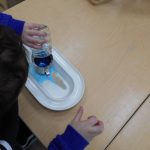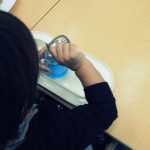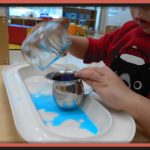Description and Learning Objectives
The materials in the Practical Life area of the Montessori community are meant to provide children with opportunities to coordinate and refine their hand movements by means of experience, particularly through repetition. These activities are available to children starting from about sixteen months of age. Some are more complex activities with a purpose. The pouring activities aim to encourage precise movement, concentration, confidence, and independence by learning to do this task independently.
Materials
- Various size containers such as cups and jugs
- Water (add food colouring for a better visual)
Observation and Findings
This pouring activity provides children with the opportunity to practice their fine motor skills. It encourages children to practice their fine motor skills. It also encourages children to further develop their palmar grasp and coordination skills. These skills are nurtured through the process and practice of holding the jug or cup with their whole palm and transferring the water from one container to the other.
This activity also promotes and supports children’s problem solving development. Children can discover and experiment ways in which they can transfer the water from one container to another. Through problem solving, they can figure out how much water they need to pour until the cup is filled or when to stop to prevent the water from over flowing. The children can also learn how fast or slow they can pour the water and how much they need to tilt the jug for the water to flow. These are all done through trial and error. It is also through this process that the children can use what they have previously experienced to find ways and solutions to get a different outcome.
Most importantly, this activity encourages children to develop a sense of self. They can gain confidence and independence by knowing and discovering things on their own. This pouring activity provides a platform for children to understand and discover the means and importance of practical living. As they grow and mature, these skills will grow with them. Then as the children master these skills, they can apply what they have experienced and incorporate them in their daily lives, confident in the knowledge that they can do it on their own!




